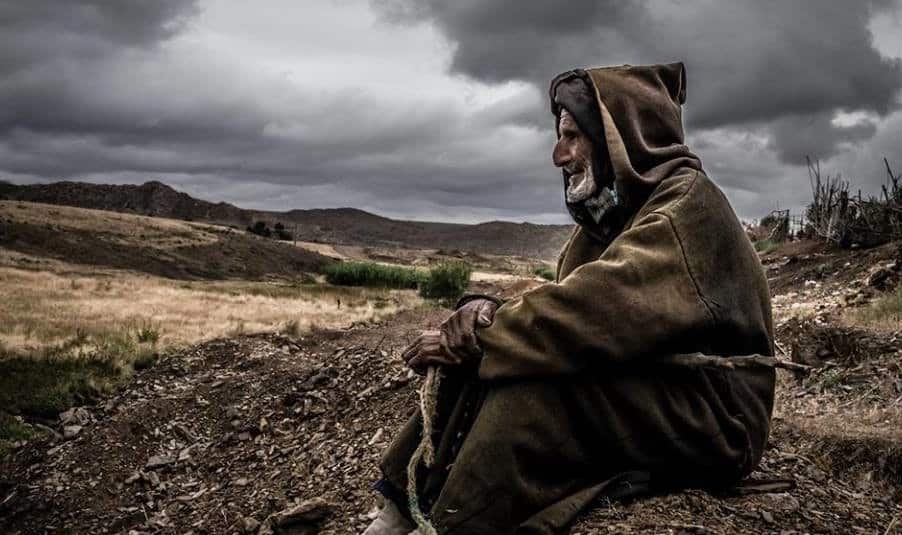The pioneer of the Frankfurt School, Theodor Adorno, once remarked, “We do not listen to music; music listens to us.”
The Amazigh community abroad has captured my attention since the 2000s. It was a period when I contemplated becoming a migrant somewhere in the world. However, due to a justifiable lack of financial resources, this dream remained elusive. Today, I see this unfulfilled dream as a blessing from God, considering that things did not unfold as planned. Who knows? Only the creator of plans and lives.
Lahcen Assinou, as he preferred to be called, is a Moroccan Amazigh migrant in Spain. He emerged as an artist and singer practically overnight. His awareness and command of the Spanish language allowed him to express the experiences of the diaspora through his song “Spania.”
Living in Spain during the financial crisis of 2010, Lahcen fled Morocco to Spain through an illegal boat trip known as “Talflokt.” Despite this, he returned to Morocco during the summer of 2010 and created a groundbreaking song that shed light on the struggles of the Amazigh diaspora in the Moroccan Southeast.
The subsequent popularity of his song, spread through CDs and MP3s, marked his sudden rise in the artistic industry. Upon his return to Spain, his song became a trending sensation on modern social media platforms. However, the detailed narratives of his first-hand experiences with Moroccan Amazigh migrants during the crisis led to numerous complaints from Spanish authorities, accusing him of defaming the migrants and criticizing the socio-economic conditions in developed countries like Spain and France. As a consequence, Lahcen was expelled from Spain and banned from re-entry.
The artistic work “Spania” is intellectually engaging, politically charged, and culturally loaded with messages, silenced voices, and lessons learned during tough times. The end justifies the means; Spain becomes a means to an end, symbolizing a better life opportunity for a simple Moroccan dream – a family, a house, a car.
The issues and questions confronting the wretched of the Earth, as described by Franz Fanon, are explored in “Moroccan Migrants in the Era of Crisis.” These include the psychological impact of unemployment, the silencing of family ties, appearances of family disintegration, signals of rebellious women, self-denial behaviors, dissatisfaction stories, past traumatic experiences in the home country, poor living conditions, weakening brotherhood, oppressed revenge left behind, the continuity of national injustice, unwavering parental support, bad luck with heavy debts invested in housing, strong attachment to the home country, weak citizens fleeing, offspring patience, endurance, and resistance, the capitalism-charged mentality extending to Tamazirt (birthplace and first-made memories), and the destiny to live away from the warmth of parents and their visionary simplicity.
Despite facing opposition from personal enemies and critics of free voices, freedom of expression, and difference-based culture, Lahcen remains fully aware of the sedition and criticism against him. This situation only strengthens his resolve to advocate for free speech in his own way, echoing the sentiment, “I sing, therefore I am.”
The transliteration and translation of the captivating Amazigh song play a crucial role in contributing to research into Amazigh songs and orality. Now, it is time to listen attentively and rejoice in the richness of Amazigh orality.


first of all let to see that durant our standing in spain .especialy in barcelona city .lahcen and other person .we attempted to show our culture and identity,we participated in many activities in the city .but the big depart was in the 2000.the church siting.in this moment we have in contact with the whole university in barcelona pompou fabra. autonoma……..this a little history to know how we paved yhe way for many migrant to show their awarenss about the amazigh identity.after lahcen and begin to song in amazigh about new life in spain.with the big gap betewen our daily life in the south with modern life in catalonyia.
lahcen assinou.t was in touch with him in barcelona city.we participated in activities together,our objective was and will be revaluation of our culture.as migrant aasinou attempted to improve his situation.but the reality in the ground is other.t respected aasinou point of view, but the migrant face multiple obstacles in his road,that s why life was forever a challange. fighting was the principe………..from barcelona ,catalonia
Thank you for confirming that he was a Moroccan migrant, whose experiences and hardships in the diaspora shaped him into a remarkable poet and artist in southeastern Morocco.